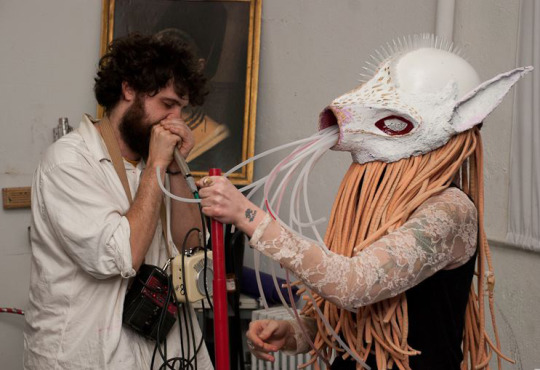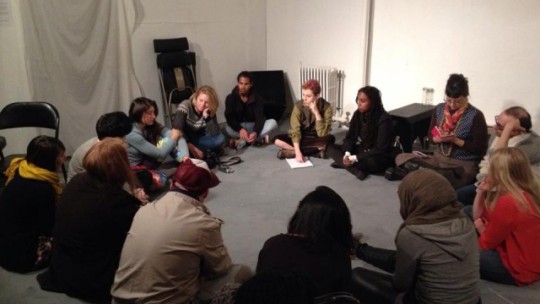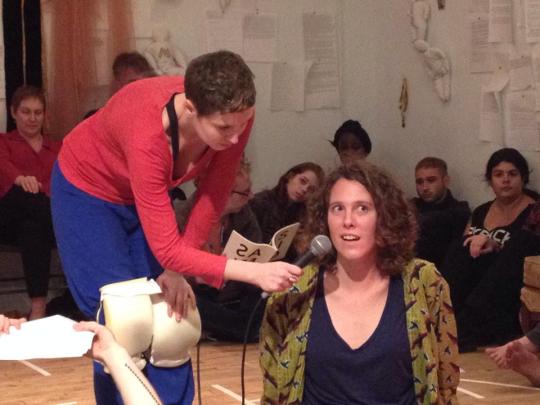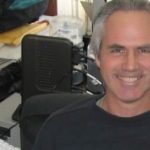COLLECTIVITY AND ENGAGEMENT: PANOPLY PERFORMANCE LABORATORY
“Our response to this challenge is to involve fellow organizers, curators, and administrators directly, as people.”
Artists Esther Neff and Brian McCorkle met at the University of Michigan and continue to collaborate in Brooklyn, NY as Panoply Performance Laboratory, a NYFA fiscally sponsored project. They generously share their dynamic insights as artists, educators and cultural workers. Experience Panoply Performance Laboratory live by attending one of their many exciting projects this August.
WHAT: Embarrassed of the Whole: PPL Present You (click this link to complete a survey for the event)
WHEN: Tuesday, August 18, 7:30 PM
WHERE: Dixon Place, 161A Chrystie Street, New York, NY between Rivington and Delancey
WHAT: Time Space Body Objects 4
WHEN: Saturday, August 22, 9:30 AM – 6 PM
WHERE: Spectacle Island, Boston, MA

NYFA: Thank you for taking the time out of Embarrassed of the Whole, your current project, to share Panoply Performance Laboratory’s (PPL) practice! Described as “unbounded by discipline or field” PPL organizes varied performative, relational and interactive projects, with a focus on addressing conflicts between individualism and collectivity. How did PPL begin and how has the group evolved? What are PPL’s experiences engaging a diverse range of concepts within a social climate of hyper-specialization?
PPL: PPL met at the University of Michigan in 2004, where we lived at Eugene V. Debs Socialist Co-Operative and began working together on a production of ‘Woyzeck.’ Our practices emerged perhaps more from the environment of cooperative living and student labor organizing than from theater and music (our respective fields of study) and have continued to follow theoretical, political, and ideological directives. At the core of our practices is social theorization, locating “opera” as “operations” methodologically designed via the forms of each project and the ideas of participants. Often, theorization takes on forms similar to theater workshops, philosophical seminars, and/or laboratory sessions.
Our focus on anti-normative interactivity, semantic constructivity, and direct political action sometimes comes into conflict with industrialized and market-based frames for art, but we have more often found that our adaptive, relational modes allow us to participate and engage critically in many different types of relationships. In many ways, it all comes down to language(s) and changing the question from “how shall we say what we are doing?“ to “how shall we do what we are doing?”
Because of this I think our grants (for example) have a problem giving a good picture of what our operas (for example) are going to look and sound like (for example) because all we can say is how and why they will look and sound. For people we’re working with—publics and collaborators—this shift (we humbly believe) is ethically mandatory to the making of art, but for those “outside” our practices, it can seem opaque.
Our response to this challenge is to involve fellow organizers, curators, and administrators directly, as people. Jill and Hoke at Grace Exhibition Space, Lital and Eyal at Glasshouse, Valerie Kuehne of The Super Coda, Kikuko Tanaka at Momenta Art, and members/founders of many other institutions like schools, community centers, libraries, and universities are ideal collaborators across aspects of projects and plans.

NYFA: How does PPL nurture these collaborations and relationships? How did PPL begin to forge such connections and why is this level of interaction central to PPL?
PPL: Starting in 2009, PPL was part of a 50-person arts and activism housing project called Surreal Estate. We began organizing exhibitions, meetings, focus workshops, and projects in the massive performance space there and at Vaudeville Park (now closed).
At first, we cold-emailed and went to the shows of artists in NYC whose practices we respected and offered them performance and exhibition space. This initial phase of reaching out started PERFORMANCY FORUM and began a series of “conferences of works.” From these conferences and platforms emerged collaborations on operas with thingNY and Lindsey Drury, other conferences like Theater as Theory (Esther with Yelena Gluzman), as well as collaborations and performances in the works of others (Brian with Varispeed and Robert Ashley, etc).
Collaborations are at the core of performance-making, especially interdisciplinary works combining visual, musical, theatrical, technological, and textual elements, which each require different skills and experiences. Collaborations are also necessary for alternative modes of production and working within performance art communities where practices are anti-commodity and artists are ideologically and practically involved in self-organizing.
NYFA: While perusing PPL’s website I came across your Statement of Intent and I was immediately reminded of the Fluxus Manifesto. What artists and cultural workers is PPL influenced and inspired by?
PPL: That’s so old! Yes. We have certainly been inspired by Fluxus, Viennese Actionism, Boal’s Theater of the Oppressed, and Performance Art in all of its interdisciplinary multiplicity. We were also (initially) obsessed with Bertolt Brecht, Georg Buechner, and the German trajectory of dialecticism through Christoph Schlingensief and his socially problematic projects like the Operndorf Afrika in Burkina Faso and projects like Adrian Piper’s philosophy journal. [This] led us to work with African and German artists in Berlin, both through MPA-B and other collaborations. In terms of other influences, Wittgenstein, James Baldwin, Joanna Drucker and SpecLab, and Robert Ashley come to mind, as do our contemporaries such as G Douglas Barrett, You Nakai/No Collective, Chloe Bass, Kikuko Tanaka, Reality Research Center, thingNY and Object Collection.
NYFA: Since you both participate in PPL, other projects and independent practices, how do you each recharge your batteries and sustain your creative energy?
PPL: As of spring 2015 our paying jobs as artists-for-hire, cultural organizers, and arts educators are merging with PPL practices. For example, we are making a new work at Momenta Art with high school students this summer,
Performancy Factory: Embarrassed of the Whole. Students are paid by the NY Department of Housing as part of a summer student labor program. We are also running a small nonprofit performance space at 104 Meserole Street as an art project in and of itself, where we also live and have studio time, thereby rolling everything we do into life practices focused around social activity.
Our goals in terms of “professionality” has been towards this integration of our lives and our work, partially as part of overarching institutional critique projects like BIPAF and PPL Space, and partially towards maintaining creative energy across all forms of engagement. We are charged by being able to experience the work of every artist who uses PPL Space, by working individually in collaborations with others, and by the creativity of the constantly shifting lives around us.

NYFA: PPL applied for a Music Program grant through New York State Council on the Arts (NYSCA) this spring. How did you learn about the grant and what was the application process like? What advice can you offer to other young collectives seeking funding?
PPL: PPL applied for this program as part of our current opera Embarrassed of the Whole. Grant writing is a lot of meticulous intensity with usually no outcome, so making grantwriting formally an aspect of the art itself has been interesting.
In terms of advice, perhaps we can learn to enjoy and use grants and funding paradigms as part of our artistic practices (which they are, anyway). At the very least, describing our work through a very structured lens can become a process of projective articulation and outlining.
NYFA: What opportunities are made possible because of PPL’s NYFA Fiscal Sponsorship that might have otherwise proved difficult or out of reach?
PPL: Access to [the organization] Materials for the Arts in New York City is probably the single most crucial aspect of any fiscal sponsorship program. This simply requires a tax letter sent between offices, but we have had two other fiscal sponsorships and only NYFA quickly and efficiently handles practical business like this. This seems obvious, but it is really so important for fiscal sponsors to work “on the ground” as part of the daily lives of their artists.
NYFA’s program specifically has also been great for us in the past few years as more international practices require institutional legitimation and tax assistance and our space itself becomes a more formal “emerging organization.” Simply being fiscally sponsored by NYFA has helped us bring international artists to NYC, and to maintain a cohesive online framing for work that operates across theater, music, and visual arts institutions. Of course, fiscal sponsorship also allows us to (and helps us) apply for grants such as New York State Council on the Arts (NYSCA), MAP Fund, Jerome Foundation, Brooklyn Arts Council, etc.
Learn more on PPL’s website, like them on Facebook, follow on Tumblr and visit the PPL website for more updates! Consider NYFA fiscal sponsorship for your next fabulous project by following this link.
– Interview conducted by Madeleine Cutrona, Program Assistant, NYFA Fiscal Sponsorship
Images: PPL, Homage to Allan Kaprow, 2013, performance invited by Glasshouse Projects, photo by Eyal Perry; PPL, America: A Prophecy, 2012, photo by Allison Wonderland; PPL exchange with Petrichor, Practicing, and the Perpetual Becoming of Performance, 2015, at PPL Space, photo by Brian McCorkle; PPL, Any Size Mirror is a Dictator, 2014, Momenta Art, photo by Robert Zott.





